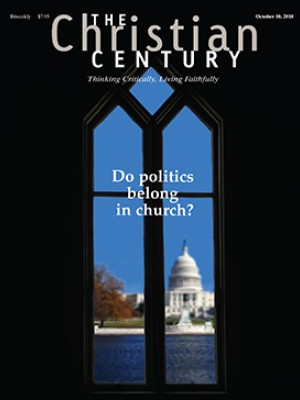October 28, Ordinary 30B (Mark 10:46-52)
Why does the crowd demand that Bartimaeus be silent?
I am writing from a hospital room where I have been holed up for several days, taking care of a family member. Of course, I am only a bit player compared to the vast apparatus of medical personnel who have been caring for her. I refill the water pitcher, find the remote when it has slipped off the bed, fetch items from the overnight bag, and (hopefully) provide good company. Most importantly, I am the advocate who finds and brings the actual professionals when they are needed.
Each room on our hallway has a light above the door that blinks on when the patient has a need. It summons forth a small army of nurses and assistants who seem to be playing Whac-A-Mole, addressing the need in one room only to have two more lights awaiting when they emerge. Our light almost never goes on. I can get more blankets and water on my own, and when we need medical assistance, I simply walk to the nurses’ station and ask in person. They almost always respond immediately. There may be other call lights on up and down the hallway, but I am standing in front of them. The squeaky wheel gets the grease.
Read our latest issue or browse back issues.
Bartimaeus is certainly a squeaky wheel. He may be blind, but there is nothing wrong with his ears. He can tell that an unusually large crowd is headed his way, and he hears the name of Jesus from their lips. “Jesus, Son of David, have mercy on me!” he cries.
I always find myself momentarily surprised by the reaction of those around Bartimaeus. According to Mark’s Gospel, “many sternly ordered him to be quiet.” How could they be so callous? Many of these people have seen or at least heard of the miraculous healing power of this prophet from Nazareth. Jesus has even healed a man from blindness at Bethsaida. Surely this blind beggar is no less worthy of his compassion.
Of course, a lot has happened since the healing in Bethsaida. Jesus has predicted his own death—three times. Now he is journeying toward Jerusalem, where many in the crowd expect him to engage in some kind of epic showdown. James and John, surely inspired by the dazzling experience of the Transfiguration, have begun jockeying for position in their master’s glorious reign. There are also likely some in the crowd who doubt the ability or desire of the Nazarene to help this blind man. They all have their own reasons—their own priorities and anxieties and desires—that consume them, that leave them blind and deaf to Bartimaeus’s plea.
But Bartimaeus keeps squeaking nonetheless, shouting again and again, “Son of David, have mercy on me! And Jesus responds. He stops along the side of the road, interrupting his final journey to Jerusalem and to the cross, to perform the last miracle of healing recorded in the Gospel of Mark.
“Your faith has made you well,” Jesus says to Bartimaeus. This faith is not a clearly espoused doctrinal confession but merely a persistent belief that Jesus has the ability to make a difference and just might do it. It takes exactly that kind of faith for wheels to keep on squeaking when other voices seek to drown them out. The voices come not only from around us but also from within. Who are you to think you deserve something from Christ? In a world where children are thrown into cages and cancer remains to be cured, you don’t think your problem is all that significant, do you? Do you really believe that God intervenes in tangible ways?
And if those voices do not silence us at once, the amount of time we wait for some response compounds their power. We struggle to keep on squeaking on our own behalf or as advocates for others, wondering whether the grease we need—grace, justice, healing—will ever come.
In addition to the pleas for wisdom, mercy, forgiveness, and healing that make up my usual litany, I have found myself squeaking over the past year on behalf of my friend Samuel Oliver-Bruno. Samuel is one of the many undocumented immigrants in the United States whose life has become much harder in recent years. Although Immigration and Customs Enforcement granted him a temporary work permit four years ago in light of his circumstances (Samuel’s wife has lupus and his son is a U.S. citizen), his application for renewal was denied in 2017. His appeal was also denied—in spite of the support and prayers of many. To avoid deportation, last December Samuel entered into the protective sanctuary offered to him by CityWell, a multicultural United Methodist church in Durham, North Carolina.
Samuel is still there today, and we continue to advocate for him and to pray on his behalf, “Son of David, have mercy on him.” There are so many other injustices and needs in this world—so many other voices crying out—that my faith and the intensity of my shouting sometimes waver. But then I remember the story of Bartimaeus and its reminder that Jesus is not too busy to respond to those who believe that he has the ability and desire to make a difference.
And so I call out again and again. I am sure that many of you do as well, each of us lifting up our plea, longing for the day when our faith might bring wholeness to ourselves, to those we love, and to our world.





